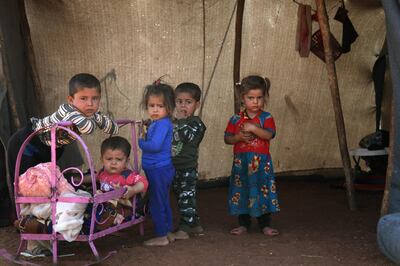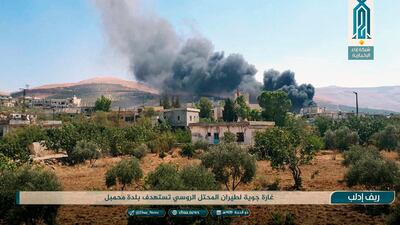As international powers scramble to avoid a devastating Syrian and Russian assault on the last rebel holdout of Idlib, doctors and medical teams on the ground are preparing for the worst.
Nearly three million civilians are essentially trapped in the province, surrounded by Syrian government forces and a closed Turkish border to the north. The United Nations has warned that a large-scale offensive would cause a "humanitarian catastrophe".
Any such attack would likely overwhelm already struggling hospitals. Only half of Idlib's public health facilities are currently operational, and doctors say they lack essential supplies.
"There is a shortage of surgeons, of doctors and of everything," said Dr Ahmed Kejeh, speaking from a hospital in the east of the province.
"We have been asking for urgent shipments of drugs and making an emergency plan to deal with what might come," he added.
The Syrian government has promised to recapture the entirety of Idlib, nearly two-thirds of which is controlled by the extremist rebel group Hayat Tahrir al-Sham (HTS).
Russian jets carried out airstrikes on Tuesday against the group, targeting "terrorist stockpiles located outside residential areas", according to a military spokesman. The Syrian Observatory for Human Rights war monitor said 13 civilians were killed, including children. The strikes came after a lull of several weeks, raising fears that an offensive may be imminent.
Pivotal talks between Russia, Turkey and Iran are due to take place on Friday, which analysts say may be followed by an all-out attack. The talks will likely revolve around the impact on Turkey, which has a considerable military presence in the area, and backs a number of rebel groups opposed to Syrian President Bashar Al Assad's rule.
In comments published on Wednesday, Turkish President Recep Tayyip Erdogan said “a serious massacre could take place,” and said he hoped Friday’s summit would avert such an outcome.
"We will take the situation to a positive point at this summit... God willing, we will be able to hinder the Syrian government's extremism in the region," Mr Erdogan was quoted as saying in the Hurriyet newspaper.
____________
Read more:
Syrian doctor jailed for opposing Assad faces prison again, for criticising Erdogan
Donald Trump warns Assad not to 'recklessly' attack Idlib
____________
Russian deputy foreign minister Sergei Ryabkov said Wednesday that the situation in Idlib would become clearer "from a military point of view" after the three countries meet.
It could become one of the deadliest battles of the Syrian civil war.
Doctors on the ground in Syria are concerned that hospitals will be targeted by Russian and Syrian airstrikes, as they have been on previous occasions. More healthcare facilities were targeted in the first four months of 2018 than in the whole of 2017, according to the UN. Eighty-nine people were killed during that time period, including medical staff and patients.
"Our biggest fear is targeting our health facilities by direct air strikes," said Dr Kejeh. “We have been working with engineers for some time now to build hospitals underground.”
Hospitals in Idlib have tried to minimise the risk of attack by sharing their coordinates with Russia on a greater scale than ever before. This “deconfliction” strategy has been used in other areas such as Deraa and Ghouta, with a limited impact.
Dr Mohamad Tannari, a doctor in rural Idlib, said “this time the situation will be worse than before.”
"I can say that people are scared, there is fear. If the shelling is as heavy as it was yesterday, then all the hospitals and medical crews won’t be able to handle or deal with the big amount of people who may come in wounded, because these local hospitals have a limited capacity," he said.

Dr Zaher Sahloul, president of MedGlobal, an organisation that sends medical missions into Syria, said even a limited offensive in the southern and western parts of Idlib would cause massive displacement, which in turn could have a potentially disastrous impact on health workers’ ability to treat patients.
"Even if you have hospitals running and they have medical supplies and medication, when you have large displacement – some are estimating between 700,000 and 1.5 million – what are they going to do? People won’t be able to come to the hospitals," he said.
Dr Sahloul, speaking from Turkey, said a contingency plan was being put in place to accommodate some 250,000 displaced people in areas closer to the Turkish border, but anything above that number will be “catastrophic.”
“If they go further north, the area is densely populated with IDPs, and it’s going to create chaos. It will put more pressure on the already stretched and thin resources in that region,” he added.
Around half of Idlib’s population are displaced from other parts of the country – the same is true for many of the doctors now working there. Most have worked in areas under heavy bombardment but the battle for Idlib could be the last major fight of the war.
In recognition of the potential scale and intensity of the task ahead of them, a number of doctors have been receiving counseling and psychological support once a week by phone, according to Dr Kejeh.
Others, according to Dr Sahloul, “have a ‘surrender to fate’ attitude.”
“They have been dealing with these attacks and displacement for the last seven years. If it comes to the worst, they can say they tried their best.”

